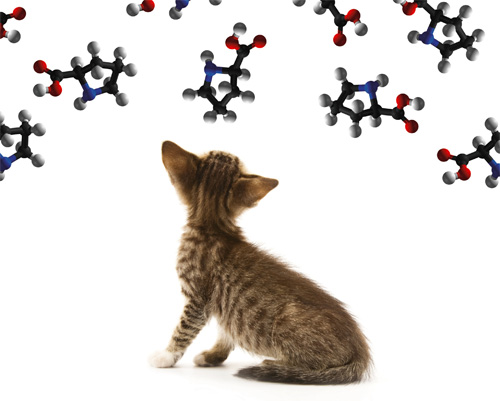 A team at OSU developed an organic catalyst to help facilitate the chemical reactions that make drugs work effectively.
A team at OSU developed an organic catalyst to help facilitate the chemical reactions that make drugs work effectively. Catalysts are the felines of the drug development world. These long-lived compounds help facilitate the chemical reactions that make drugs work effectively, but are never actually consumed themselves. Of course, having so many lives is not always a good thing. And the problem with catalysts is they are typically made from toxic metals, which can create hazardous waste problems. So a few years ago, a team at Oregon State University developed Hua Cat, an “organocatalyst” that is more environmentally friendly than the conventional kind. Derived from non-toxic, soluble elements such as amino acids, Hua Cat also has the ability to trigger “unique sorts of chemical reactions” that will be useful for drug discovery, says Rich Carter, an Oregon State University professor of chemistry and co-inventor of the new catalyst. Carter says his team created Hua Cat because nothing else worked for one of the compounds they were trying to develop and only afterward realized the organocatalyst had a much broader range of applications. Supported by the University Venture Development Fund, a state program designed to commercialize university-based discoveries, Hua Cat is now being manufactured by Albany-based Synthetech. About that name. It’s a reference to Hua Yang, an OSU postdoctoral research associate who was the first person to make the new compound. Says Carter: “My students started saying ‘Hua Cat,’ and it stuck.”
Catalysts are the felines of the drug development world. These long-lived compounds help facilitate the chemical reactions that make drugs work effectively, but are never actually consumed themselves. Of course, having so many lives is not always a good thing. And the problem with catalysts is they are typically made from toxic metals, which can create hazardous waste problems. So a few years ago, a team at Oregon State University developed Hua Cat, an “organocatalyst” that is more environmentally friendly than the conventional kind. Derived from non-toxic, soluble elements such as amino acids, Hua Cat also has the ability to trigger “unique sorts of chemical reactions” that will be useful for drug discovery, says Rich Carter, an Oregon State University professor of chemistry and co-inventor of the new catalyst. Carter says his team created Hua Cat because nothing else worked for one of the compounds they were trying to develop and only afterward realized the organocatalyst had a much broader range of applications. Supported by the University Venture Development Fund, a state program designed to commercialize university-based discoveries, Hua Cat is now being manufactured by Albany-based Synthetech. About that name. It’s a reference to Hua Yang, an OSU postdoctoral research associate who was the first person to make the new compound. Says Carter: “My students started saying ‘Hua Cat,’ and it stuck.”
LINDA BAKER


